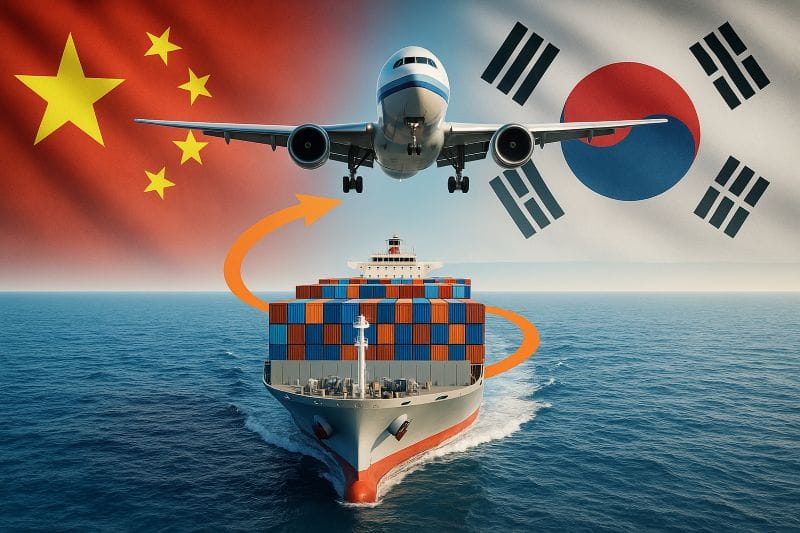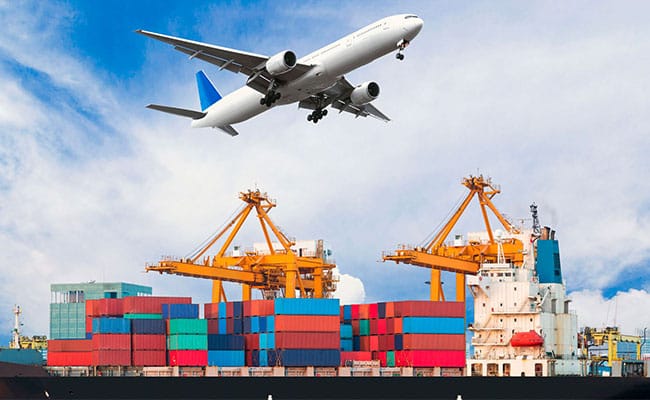With the continuous development of cross-border e-commerce and global supply chains, more and more individuals and businesses rely on raw materials, parts and finished products from China. To import goods from China, this article will introduce the cost of shipping from China to South Korea in detail.

Introduction to South Korea
South Korea is located in the southern part of the Korean Peninsula, surrounded by the sea on three sides, and is very close to China across the Yellow Sea. Due to limited resources, South Korea is highly dependent on import and export trade. Its major ports, Busan, Incheon and Gwangyang, all have advanced logistics infrastructure and are important transit hubs in East Asia.
Geographical proximity makes the logistics transportation time between China and South Korea shorter. Sea transportation usually takes only 2-5 days, and air transportation can be completed within 1-2 days, which reduces logistics costs and improves supply chain efficiency.
Sea Freight Cost from China to South Korea
Sea Freight has stable freight rates, low costs, dense routes, short export time, mature procedures, simple operation, frequent trade between China and South Korea, high bilateral customs clearance efficiency, and standardized processes. Freight forwarders and shipping companies are rich in resources and it is easier to book space.
Cost composition of ocean shipping
- Ocean shipping: basic freight of shipping company
- Trailer fee: land freight between factory and port, calculated by distance and container type (20GP/40HQ)
- Terminal Handling Charge (THC): Terminal Handling Charge
- Document fee: Bill of Lading, Manifest and other document fees (
- LCL handling fee (if applicable): LCL cargo needs to be disassembled, labeled, divided, etc., and is charged by cubic meter
- Surcharge: floating charges such as fuel surcharge (BAF) and peak season surcharge (PSS)
LCL Shipping Cost from China to South Korea
For small-value cargo, LCL transportation is an economical option. Your cargo shares container space with other cargo, and you only need to pay for the space occupied by the cargo, which is generally charged by cubic meter:
| POL (Port of China) | POL (Port of South Korea) | LCL Shipping Cost |
|---|---|---|
| Shanghai | Busan | $25–$55 |
| Shenzhen | Busan | $30–$60 |
| Ningbo | Busan | $25–$50 |
| Shanghai | Incheon | $25–$60 |
| Shenzhen | Incheon | $40–$55 |
| Ningbo | Incheon | $35–$50 |
| Shanghai | Gwangyang | $25–$$50 |
| Shenzhen | Gwangyang | $30–$50 |
| Ningbo | Gwangyang | $30–$55 |
Cost of Shipping 20ft and 40ft Containers from China to South Korea
For businesses that need to fill a whole container with bulk goods, full container shipping is an ideal choice. When shipping in bulk, full container shipping is safer and has lower unit costs. Generally, the charges are based on the size of the container (20ft and 40ft):
| POL (Port of China) | POL (Port of South Korea) | 20ft Container Cost | 40ft Container Cost |
|---|---|---|---|
| Shanghai | Busan | $300-$500 | $500 – $950 |
| Shenzhen | Busan | $340 – $550 | $520 – $850 |
| Ningbo | Busan | $300 – $550 | $530 – $990 |
| Shanghai | Incheon | $320 – $600 | $510 – $1000 |
| Shenzhen | Incheon | $320 – $540 | $530 – $950 |
| Ningbo | Incheon | $320 – $550 | $500 – $1050 |
| Shanghai | Gwangyang | $350 – $510 | $520 – $940 |
| Shenzhen | Gwangyang | $325 – $570 | $540 – $850 |
| Ningbo | Gwangyang | $330 – $550 | $520 – $900 |

Air Freight Cost from China to South Korea
Air Freight is extremely fast and suitable for urgent goods. With frequent flights, you can choose from many airlines, high frequency, flexible flight time, fast export process, simple procedures, and door-to-door service to meet the needs of different trade methods.
Suitable for light, small and high-value goods, such as electronic accessories, clothing samples, cosmetics, luxury goods, urgent order replenishment, etc.
Composition of transportation costs:
- Air freight: If the volume weight of the goods is higher than the actual weight, the freight is calculated according to the volume weight, weight (kg) = length (cm) × width (cm) × height (cm) ÷ 6000.
- Door-to-door pickup fee: quoted according to the distance between the cities, some support self-delivery to the airport
- Customs clearance fee: export customs clearance service fee
- Airport miscellaneous fees: such as palletizing fees, security inspection fees, airport ground handling fees, etc. (often incorporated into the freight rate)
- Document fees: commodity inspection documents, invoice preparation, etc. (if necessary)
| Departure Airport (China) | Arrival Airport (South Korea) | Cost Range (USD/kg) |
| Shanghai Pudong | Incheon | $3.0 – $6.6 |
| Beijing Capital | Incheon | $3.5 – $6.8 |
| Guangzhou Baiyun | Incheon | $4.5 – $7.0 |
| Shanghai Pudong | Gimpo | $3.0 – $5.5 |
| Beijing Capital | Gimpo | $4.5 – $6.8 |
| Guangzhou Baiyun | Gimpo | $4.0 – $6.8 |
Here are the costs for shipping from China to other countries:
How Much Does it Cost to Ship from China to Japan
Tariffs for Shipping from China to South Korea
Tariffs for shipping from China to South Korea mainly include import tariffs, value-added tax (VAT), and possible consumption tax.
Import tariffs
South Korea imposes an average tariff of about 8% on most imported goods, but the specific tax rate depends on the HS code (customs code) of the goods. For example, tariffs on certain goods such as umbrellas may be as high as 13%.
Value-added tax (VAT)
All imported goods are subject to a 10% VAT, the tax base of which is the duty-paid price (CIF price, i.e. cost + insurance + freight) of the goods plus the tariff.
Consumption tax
A consumption tax of 10% to 20% is levied on luxury goods and durable consumer goods (such as alcohol, cigarettes, cars, etc.).
Key Factors Affecting of Shipping Cost from China to South Korea
The factors that determine the cost of shipping from China to South Korea mainly include:
- Cargo volume and weight: air freight is charged by volume or actual weight, and sea freight is charged by the number of containers
- Transportation method: air freight is the most expensive, and sea freight is the cheapest
- Seasonal factors: Freight rates rise during peak seasons (such as before the Spring Festival and at the end of the year)
- Fuel price fluctuations: affect sea and air freight surcharges
- Customs clearance complexity: special goods (such as lithium batteries, food) may increase costs
- Distance between departure port and destination port: The distance between different ports is different
Strategies to Reduce of Shipping Cost from China to South Korea
Choosing the following strategies can effectively reduce the cost of shipping from China to South Korea

- Packaging goods in advance and shipping them uniformly to reduce the cost of frequent small-batch shipments
- Selecting a reasonable mode of transportation, such as low value of goods, give priority to LCL or dedicated lines
- Using China-South Korea sea/air transportation dedicated lines to avoid peak cost fluctuations
- Estimate tariffs and VAT to ensure compliance with declarations and avoid additional fines
- Choose a freight forwarder with transparent services to avoid hidden fees
- Consolidation improves transportation efficiency and cost-effectiveness
How to Find the Best Freight Forwarding Company
When looking for a suitable freight forwarding company from China to South Korea, you can consider the following aspects:
- Is there a bilateral operation network between China and South Korea (shipping from China + customs clearance and delivery in South Korea)
- Does it provide multiple modes of transportation (air, sea, dedicated line, small package)
- Is the quotation transparent to avoid hidden charges
- Is the customer evaluation and service feedback good
- Does it support one-stop service (packaging, export declaration, customs clearance, delivery)
- Is there a dedicated customer service, timely response, efficient problem handling
The cost of shipping from China to South Korea is affected by the mode of transportation, type of goods, seasonal factors, etc. By choosing a reasonable logistics solution, optimizing the customs clearance process, and cooperating with a reliable freight forwarder, you can significantly reduce transportation costs and improve efficiency.
